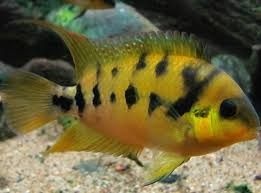Aquarist Species: Amatitlania nanolutea
Aquarist: swells
Species Profile: Amatitlania nanolutea

General species photo
Description: A Central American CARES species native to Panama. Listed as vulnerable in the wild.
Category: Cichlids
Global Region: Central America
Distribution: Panama
CARES Classification: Vulnerable
Aquarist Notes
Photo of aquarist's species:

Collection Point: Unknown
Genetic Line: Aquarium Strain
Year Acquired: 2024
Acquired six juveniles (four female and two male) from Mike Liu at ACA 2024. They are separated into three tanks - one female and one male in a 40g breeder, one male and one female in a 20g long, and two females in another 40g breeder that is heavily planted. I am waiting on the pair in the 20g long to spawn.
UPDATE: The pair in the 40 breeder spawned twice (3/5/25 and 4/20/25). All the fry from the first spawn, maybe 35, disappeared within a week. I am guessing they were eaten because the numbers just kept dwindling yet I never once saw a dead one (unless they were being eaten post-mortem). The second spawn produced probably closer to 50 fry. Over time, they too dwindled to about 8. The largest is now probably a little over 1".
Spawning notes:
Species Spawned: Yes
I provided the 40g pair with several ceramic cave options, including upturned pots with a cutout. The female chose a custom breeding cave with a flat top.
The tank is bare bottom, which enabled me to spot fry from both broods quickly. Both adults care for the fry, alternating with no discernible pattern. I even witnessed the male move a fry once with his mouth.
I ended up separating the adults within a few weeks post-spawn because the male was harassing the female. Once I removed the male, the female took to an upturned clay pot instead of her breeding cave. Within a couple of months, the female stopped paying any attention to the fry.
Have Reared Fry? Yes
Once free swimming, the fry did not eat anything free-floating. They would only pick at bits either on the bottom of the tank or especially food stuck to caves, leaves, etc.
I didn't find them to be particularly fussy about the food. They have eaten only crushed flake or golden pearls.
Once they reached juvenile stage, they now will eat free-floating food and, in fact, will move to the front of the tank and come near the surface when I approach the tank. They now happily consume free-floating bits of flake.
Young fish available? Yes